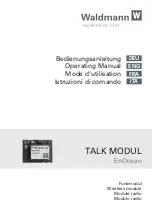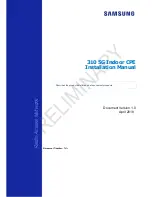
Chapter 3: System planning
Data network planning
Page
3-40
In conjunction with the NAT features, each SM provides:
•
A DHCP server that assigns IP addresses to computers connected to the SM by Ethernet protocol.
•
A DHCP client that receives an IP address for the SM from a network DHCP server.
DMZ
In conjunction with the NAT features, a DMZ (demilitarized zone) allows the assignment of one IP
address behind the SM for a device to logically exist outside the firewall and receive network traffic. The
first three octets of this IP address must be identical to the first three octets of the NAT private IP
address.
Developing an IP addressing scheme
Network elements are accessed through IP Version 4 (IPv4) addressing.
A proper IP addressing method is critical to the operation and security of a network.
Each module requires an IP address on the network. This IP address is for only management purposes.
For security, you must either:
•
Assign a non-routable IP address.
•
Assign a routable IP address only if a firewall is present to protect the module.
You assign an IP addresses to computers and network components by either static or dynamic IP
addressing. You will also assign the appropriate subnet mask and network gateway to each module.
Address Resolution Protocol
As previously stated, the MAC address identifies a module in:
•
Communications between modules.
•
The data that modules store about each other.
The IP address is essential for data delivery through a router interface. Address Resolution Protocol
(ARP) correlates MAC addresses to IP addresses.
For communications to outside the network segment, ARP reads the network gateway address of the
router and translates it into the MAC address of the router. Then the communication is sent to MAC
address (physical network interface card) of the router.
For each router between the sending module and the destination, this sequence applies. The ARP
correlation is stored until the ARP cache times out.
Allocating subnets
The subnet mask is a 32-bit binary number that filters the IP address. Where a subnet mask contains a
bit set to 1, the corresponding bit in the IP address is part of the network address.
Example IP address and subnet mask
In
, the first 16 bits of the 32-bit IP address identify the network:
















































